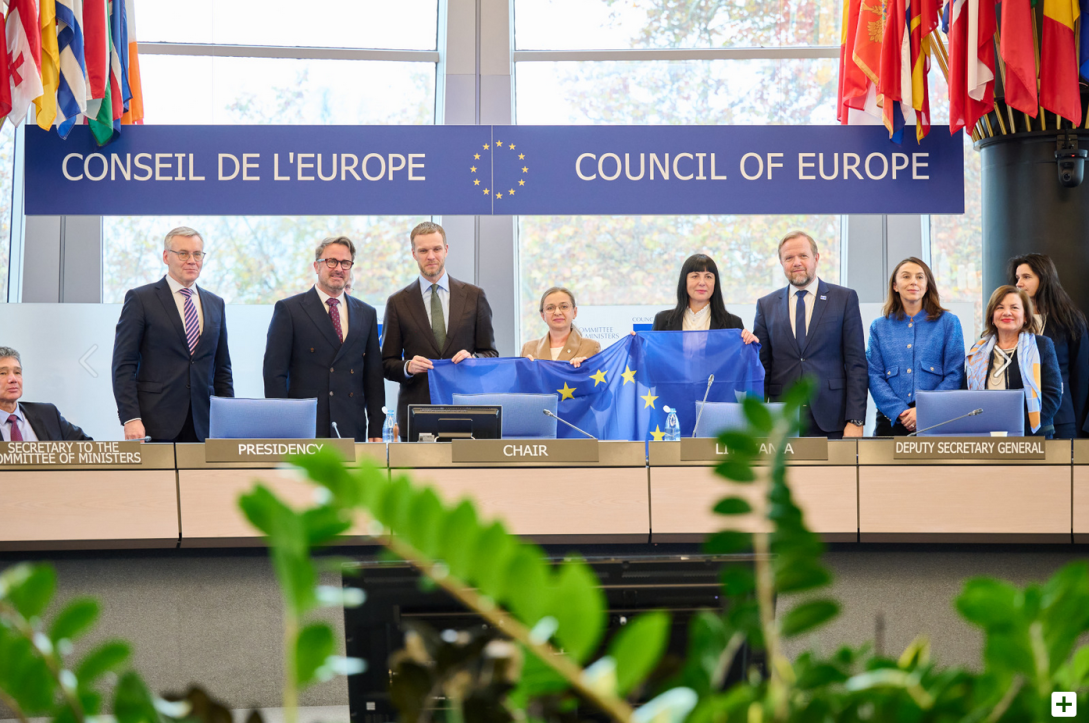Lithuania Hands Over Council of Europe Presidency to Luxembourg: A New Chapter Begins

Lithuania's Legacy of Accountability and Support for Ukraine
During his closing address, Mr Landsbergis underscored the Lithuanian Presidency’s unwavering commitment to supporting Ukraine amidst the ongoing Russian aggression. He highlighted the efforts to promote justice and accountability for war crimes, emphasising the Presidency’s role in supporting the smooth operation of the Register of Damage for Ukraine caused by the Russian Federation against Ukraine and pushing for a Comprehensive Compensation Mechanism. One of the standout achievements under Lithuania’s presidency was the adoption of the Vilnius Declaration by the Ministers of Justice of 42 Council of Europe member and observer states. The Declaration, adopted in the presence of European Commission Vice President Věra Jourová, reaffirms the urgent need for an effective Special Tribunal for the Crime of Aggression against Ukraine, giving political impetus for its establishment. It welcomes the work of the Council of Europe and the European Union within the Core Group consultations, where the tribunal’s establishment under the Council's auspices has been identified as a viable path forward. Furthermore, the Declaration encourages states and international organizations to actively support and contribute to these efforts, reinforcing the principles of justice and accountability.
Moreover, the Lithuanian Chairmanship prioritised the protection of vulnerable groups, particularly focusing on the rights of Ukrainian children forcibly deported to Russia. The Presidency also marked the Council of Europe's 75th anniversary by advocating for human rights, freedom of expression, and the protection of civil society. Key milestones included supporting Belarusian civil society, signing an agreement to open a Council of Europe Information Point for Belarusian citizens in Vilnius, and hosting numerous high-level meetings across major cities like Strasbourg, New York, and Vilnius.
Lithuania's chairmanship was distinguished by its progressive leadership in digital governance, exemplified by the landmark Vilnius Convention on Artificial Intelligence. Signed during the informal Council of Europe Ministers of Justice conference on September 5, 2024, the Convention represents the world's first legally binding international agreement on AI. Aimed at ensuring that AI systems uphold human rights, democracy, and the rule of law, it reflects a collective commitment to ethical AI development. Notably, the European Union, represented by the European Commission, was among the signatories, underscoring the Convention's significance as a unifying framework for international cooperation in this critical field.
Luxembourg's Vision: Strengthening Democracy, Inclusivity, and Cultural Cohesion
As the baton was passed, Luxembourg's Minister for Foreign Affairs, Mr Xavier Bettel, outlined his country’s vision for the next six months of Luxembourg’s Presidency under the banner of three core themes:
- Rule of Law and Democracy: Luxembourg’s Presidency will build on the foundation laid by its predecessor, with a focus on upholding accountability for crimes committed during the war in Ukraine. This includes promoting mechanisms for compensation, furthering the Register of Damage, and exploring the establishment of a special international criminal tribunal. During its Chairmanship, Luxembourg also aims to bolster the European Convention on Human Rights by ensuring the effective implementation of its judgments.
- Living Together: Emphasising inclusivity and social cohesion, Luxembourg will work to foster mutual respect and understanding across Europe’s diverse societies. Key initiatives include combating discrimination, promoting gender equality, and protecting the rights of children affected by conflicts, particularly in Ukraine. This theme also extends to supporting vulnerable communities such as the elderly and persons with disabilities. Luxembourg Chairmanship’s commitment to environmental protection will see efforts to integrate human rights into environmental policies, exploring a new convention on protecting the environment through criminal law.
- Culture, Sport, and Heritage: Recognising the role of culture as a unifying force, Luxembourg will celebrate the 70th anniversary of the European Cultural Convention. The Presidency will promote cultural and social cohesion, especially among the youth, while championing safe and inclusive sports initiatives with a focus on child protection and gender equality.
A Ceremony of Continuity and Commitment
The official handover ceremony featured poignant moments, including a moving testimony by two Ukrainian women, Olena Shyvydka, Chair of the Ivanivka Community in the Chernihiv district of Ukraine, and Ms Inesa Antonenko, Head of the Children’s Rights Service of the Ivanivka Community who shared harrowing accounts of atrocities committed by Russian troops in their home village in the Chernihiv region. This heartfelt segment underscored the ongoing human rights crisis and the Council of Europe’s role in addressing these urgent issues.
The ceremony continued with a special tram dedicated to this historic transition, which transported the deputies to Place Broglie. There, a symbolic ceremony of changing Lithuania's flag to Luxembourg's flag officially marked the beginning of Luxembourg's Presidency. This unique gesture not only highlighted the importance of the moment but also underscored the seamless continuity in leadership within the Council of Europe.
Mr Bettel reaffirmed Luxembourg’s commitment to ensuring that the Council of Europe remains a beacon of support for Ukraine and a staunch defender of human rights across its Member States. By focusing on democracy, inclusivity, and cultural unity, Luxembourg aims to strengthen the Council’s mission during its term.
Looking Ahead: A Unified Europe
The transition of the Presidency, which rotates among Member States every six months, reflects the Council of Europe’s enduring commitment to promoting human rights, democracy, and the rule of law across the continent. As Luxembourg takes the helm, it inherits a legacy of resilience and advocacy from Lithuania and aims to further these ideals amidst a rapidly changing global landscape.
The transfer of leadership not only marks the closing of one chapter but also sets the stage for a new era of cooperation, inclusivity, and progress within the Council of Europe.








